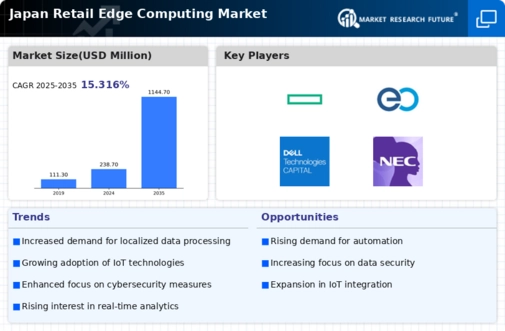Focus on Supply Chain Optimization
Supply chain optimization is emerging as a critical driver for the retail edge-computing market in Japan. Retailers are increasingly recognizing the importance of efficient supply chain management to enhance operational performance and reduce costs. By utilizing edge-computing technologies, businesses can gain real-time insights into inventory levels, demand fluctuations, and supplier performance. This capability allows for more agile decision-making and improved responsiveness to market changes. Recent studies indicate that retailers implementing edge-computing solutions for supply chain optimization can achieve up to a 25% reduction in logistics costs. As the retail landscape becomes more competitive, the focus on supply chain efficiency is likely to propel the growth of the retail edge-computing market, as companies seek to leverage technology for better operational outcomes.
Expansion of 5G Network Infrastructure
The expansion of 5G network infrastructure is poised to significantly impact the retail edge-computing market in Japan. With the rollout of 5G technology, retailers can expect faster data transmission speeds and lower latency, which are crucial for real-time data processing and analytics. This advancement enables retailers to implement more sophisticated edge-computing solutions, such as augmented reality (AR) applications and smart inventory management systems. As of November 2025, it is estimated that 5G adoption in Japan will reach approximately 50%, facilitating a more connected retail environment. The enhanced connectivity provided by 5G networks allows for seamless integration of IoT devices, further driving the demand for edge-computing solutions. Consequently, the retail edge-computing market is likely to witness substantial growth as retailers capitalize on the benefits of 5G technology.
Increased Regulatory Compliance Requirements
Increased regulatory compliance requirements are influencing the retail edge-computing market in Japan. As data privacy and security regulations become more stringent, retailers are compelled to adopt edge-computing solutions that ensure compliance with local laws. This trend is particularly relevant in light of Japan's Personal Information Protection Act (PIPA), which mandates strict guidelines for data handling and storage. Retailers are leveraging edge-computing technologies to process sensitive customer data locally, thereby minimizing the risk of data breaches and ensuring compliance. As of November 2025, it is estimated that compliance-related investments in the retail sector will exceed $1 billion, highlighting the financial implications of regulatory adherence. Consequently, the retail edge-computing market is likely to expand as businesses prioritize compliance and data security in their operational strategies.
Rising Demand for Enhanced Customer Experiences
The retail edge-computing market in Japan is experiencing a notable surge in demand for enhanced customer experiences. Retailers are increasingly leveraging edge-computing technologies to deliver personalized services and real-time interactions. This shift is driven by consumer expectations for seamless shopping experiences, both online and in-store. According to recent data, approximately 70% of Japanese consumers express a preference for personalized shopping experiences, prompting retailers to adopt edge-computing solutions that facilitate data processing closer to the point of sale. By utilizing these technologies, retailers can analyze customer behavior and preferences in real-time, thereby optimizing inventory management and improving customer satisfaction. This trend indicates a significant opportunity for growth within the retail edge-computing market, as businesses strive to meet evolving consumer demands.
Integration of Artificial Intelligence Solutions
The integration of artificial intelligence (AI) solutions is becoming increasingly prevalent in the retail edge-computing market in Japan. Retailers are adopting AI-driven applications to enhance operational efficiency and decision-making processes. For instance, AI algorithms can analyze vast amounts of data generated at the edge, enabling retailers to forecast demand accurately and optimize supply chains. Recent statistics suggest that the implementation of AI in retail could lead to a 30% reduction in operational costs. Furthermore, AI-powered chatbots and virtual assistants are being utilized to improve customer service, providing instant support and recommendations. This integration not only streamlines operations but also enhances the overall shopping experience, indicating a robust growth trajectory for the retail edge-computing market as businesses increasingly rely on AI technologies.

















